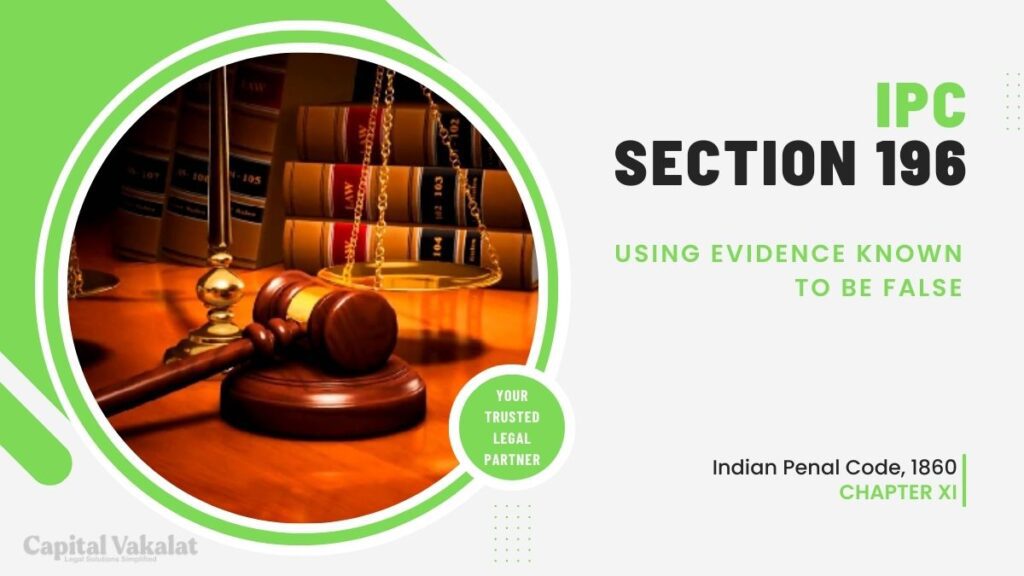In the realm of criminal law and legal proceedings, truth and credibility are paramount. The Indian Penal Code (IPC) plays a crucial role in maintaining justice by ensuring that individuals presenting evidence in court do so truthfully. Section 196 IPC deals with the usage of evidence known to be false.

In this article, we will explore the nuances of this legal provision, its implications, and the consequences for those found guilty of presenting false evidence.
Understanding Section 196 IPC
What is Section 196 IPC?
Section 196 of the Indian Penal Code, often referred to as IPC, is a legal provision that deals with the offense of knowingly using evidence that is false. This section is in place to maintain the integrity of legal proceedings and prevent miscarriages of justice. It is important for everyone involved in the legal process, from witnesses to lawyers, to understand the significance of presenting accurate and truthful evidence.
Importance of Evidence in Legal Proceedings
Evidence is the cornerstone of any legal proceeding. It serves as the foundation upon which judgments are made. In a court of law, judges and juries heavily rely on the evidence presented to reach a fair verdict. False evidence undermines the very essence of justice, making Section 196 IPC of utmost importance.
False Evidence and its Implications
Types of False Evidence
False evidence can take various forms, such as fabricated documents, perjured testimonies, or misleading information. This section covers a broad spectrum of activities aimed at deceiving the court and influencing the outcome of a case. Whether it’s a forged contract, a falsified alibi, or manipulated facts, all such actions fall under the purview of Section 196 IPC.
Legal Consequences
Punishments for Using False Evidence
The consequences of using false evidence can be severe. Section 196 IPC outlines the punishments for individuals found guilty of presenting false evidence in a legal proceeding. These penalties may include fines, imprisonment, or both, depending on the gravity of the offense. Furthermore, it can tarnish one’s reputation and credibility, both personally and professionally.
Recent Cases and Their Outcomes
To understand the real-world implications of Section 196 IPC, it’s essential to look at recent cases and their outcomes. Several individuals have faced legal action for presenting false evidence, and their experiences serve as a warning to others contemplating similar actions.
The Role of the Legal System
The legal system plays a pivotal role in ensuring that Section 196 IPC is enforced effectively. Judges, lawyers, and law enforcement agencies collaborate to investigate cases of false evidence and bring the culprits to justice. The legal system’s efficiency in dealing with such cases contributes to upholding the rule of law.
Challenges in Proving False Evidence
Proving that evidence is false can be challenging. Perpetrators of this offense often go to great lengths to make their deception appear genuine. This section delves into the difficulties that legal authorities face in establishing the falseness of evidence.
Preventive Measures
Preventing the use of false evidence is as crucial as penalizing those who present it. This section discusses preventive measures, including stricter regulations and enhanced awareness among legal professionals and witnesses.
Importance of Ethical Conduct
Maintaining ethical conduct in legal proceedings is vital. When individuals involved in a case adhere to ethical standards, the risk of false evidence diminishes. Legal ethics and professional responsibility are emphasized in this section.
Conclusion
In conclusion, Section 196 IPC stands as a safeguard against the presentation of false evidence in legal proceedings. Upholding the integrity of the legal system and ensuring justice is the collective responsibility of all individuals involved in the process. It is imperative that we maintain the highest standards of honesty and integrity when participating in legal matters.
Frequently Asked Questions
Can presenting false evidence lead to criminal charges?
Yes, presenting false evidence can lead to criminal charges, including fines and imprisonment, as per Section 196 IPC.
How can individuals protect themselves from being accused of presenting false evidence?
Individuals can protect themselves by ensuring the accuracy and truthfulness of the evidence they present and maintaining ethical conduct throughout legal proceedings.
Are there any recent cases that highlight the consequences of using false evidence?
Yes, there have been several recent cases where individuals faced legal action for presenting false evidence, leading to penalties and damage to their reputations.